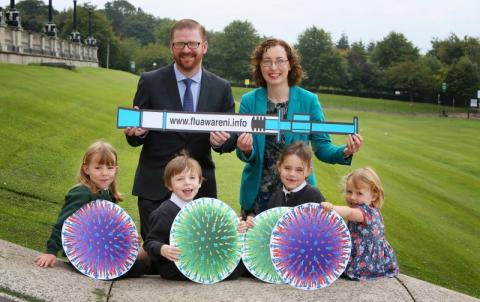Childhood flu vaccination now available

The Public Health Agency (PHA) has launched this year’s childhood flu vaccination programme, reminding parents how important it is that their child receives the vaccine, which will help protect against the disease and reduce its spread.
The vaccine changes each year to cover the strains which are likely to be prevalent over the course of the flu season, so it’s important that children get immunised annually.
All pre-school children aged two years and over on 1 September 2015, and those in primaries one to seven, will be offered the flu vaccine as part of the programme.
The vaccine will be administered through schools. Younger pre-school children can receive the vaccine from their GP surgeries.
Health Minister Simon Hamilton said: “I would encourage parents and guardians of all eligible children to take up this offer of flu vaccination for their child as it will help protect them and reduce the risk of passing the disease on to other children or family members, some of whom may be at increased risk of becoming seriously ill if they get infected with the flu virus”.
Dr Lucy Jessop, Consultant in Health Protection at the PHA, said: “Immunisation for this age group is very important as the flu virus spreads easily and quickly, infecting both adults and children alike. Flu causes unpleasant symptoms such as fevers, chills, aching muscles and joints, headaches and extreme tiredness. These symptoms can last between two and seven days, and for some can lead to serious illness and result in a stay in hospital.
“Last year, 80% of children were vaccinated and a similar uptake this year could have a significant impact on the amount of flu we may see.
“The flu virus spreads through the air when people cough and sneeze without covering their nose and mouth, and because young children don’t always cover their noses or mouths when coughing or sneezing, the virus can spread very quickly among them”.
Most children receive the vaccine via a quick and painless nasal spray. The nasal vaccine has been shown to provide even greater protection for children than the flu injection. There are a few children who cannot receive the nasal spray and they will be offered the injection instead.
Chief Medical Officer Dr Michael McBride said: "Seasonal flu can be a very serious illness, particularly for those in the 'at risk' groups, which is why we already offer vaccinations to these people.
“The children’s flu programme is based on the advice of the Joint Committee on Vaccination and Immunisation (JCVI) that rolling out the annual programme to children will help protect children and further protect the most vulnerable members of society”.
All 'at risk' children should continue to receive the flu vaccine as they have done in previous years. Those in primary school will receive it via their school nurse while those not in primary school will receive it via their GP.
Parents of pre-school children can check with their GP practice on arrangements for getting the vaccine. Parents of primary school children should look out for letters and consent forms over the next couple of months as children should be bringing them home in their school bags.
For more information about the flu vaccine visit www.fluawareni.info or speak to your GP or member of staff within the school nurse team at your local Health and Social Care Trust.
Photo caption:
Back row l-r Health Minister Simon Hamilton and Dr Lucy Jessop, Consultant in Health Protection PHA.
Front row l-r Amelia Geddes (Rosetta PS), Luke Wilson (Holywood PS), Philippa Wilson (Holywood PS) and Jessica Geddes (Bumbles Nursery).
